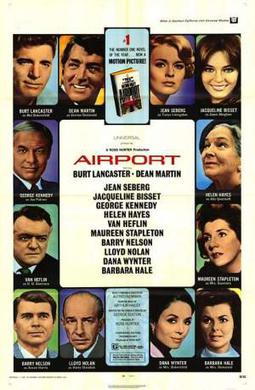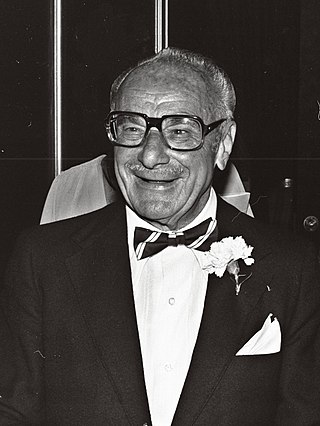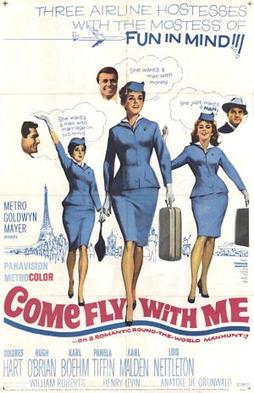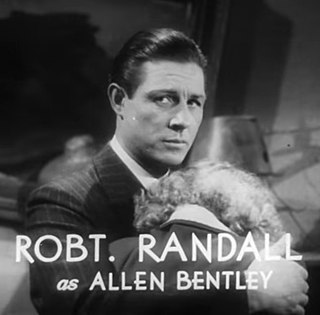
Airport is a 1970 American air disaster–drama film written and directed by George Seaton and starring Burt Lancaster and Dean Martin. Based on Arthur Hailey's 1968 novel of the same name, it originated the 1970s disaster film genre. It is also the first of four films in the Airport film series. Produced on a $10 million budget, it earned over $128 million. The supporting cast features Jean Seberg, Jacqueline Bisset, George Kennedy, Helen Hayes, Van Heflin, Maureen Stapleton, Barry Nelson, Lloyd Nolan, Dana Wynter and Barbara Hale.

Boeing Boeing is a 1965 American bedroom farce comedy film based on the 1960 French play Boeing-Boeing and starring Tony Curtis and Jerry Lewis. Released on December 22, 1965, it was the last film that Lewis made for Paramount Pictures, which had produced all of his films since My Friend Irma (1949).

A flight attendant, traditionally known as a steward or stewardess ; or air host or hostess, is a member of the aircrew aboard commercial flights, many business jets and some government aircraft. Collectively called cabin crew, flight attendants are primarily responsible for passenger safety and comfort.

Joe Dirt is a 2001 American adventure comedy film, directed by Dennie Gordon, starring David Spade, Dennis Miller, Christopher Walken, Adam Beach, Brian Thompson, Brittany Daniel, Jaime Pressly, Erik Per Sullivan, and Kid Rock. The film was written by Spade and Fred Wolf, and produced by Robert Simonds. The plot revolves around a young poor white man, Joe Dirt, who at first seems to be a loser. As he travels in search of his parents, his finer qualities are increasingly revealed. He ends up with a new family of close friends, people he has helped and who respect him. While critical reception was mostly negative, the film was a modest financial success, eventually becoming a cult favorite. A sequel, Joe Dirt 2: Beautiful Loser, premiered on Crackle on July 16, 2015.

That's Entertainment! is a 1974 American compilation film released by Metro-Goldwyn-Mayer to celebrate the studio's 50th anniversary. The success of the retrospective prompted a 1976 sequel, the related 1985 film That's Dancing!, and a third installment in 1994.

Fritz Feld was a German-American film character actor who appeared in over 140 films in 72 years, both silent and sound. His trademark was to slap his mouth with the palm of his hand to create a "pop" sound.

Airport 1975 is a 1974 American air disaster film and the first sequel to the successful 1970 film Airport. It was directed by Jack Smight, produced by William Frye, executive produced by Jennings Lang, and written by Don Ingalls. The film stars Charlton Heston, Karen Black, George Kennedy and Gloria Swanson – as a fictionalized version of herself – in her final film role.
Donald Sutherland Bain was an American author and ghostwriter, having written over 115 books in his 40-year career.

Come Fly with Me is a 1963 British Jet Age romantic comedy film directed by Henry Levin and released by MGM. Featuring an ensemble cast of Dolores Hart, Hugh O'Brian, Karlheinz Böhm, Pamela Tiffin, Karl Malden, and Lois Nettleton, it is based on Bernard Glemser's 1960 chick-lit novel Girl on a Wing, which was published again in 1969 under the title The Fly Girls. It follows three young international air hostesses looking for romance and excitement, weaving abundant soap opera elements into its tale of opportunity for glamorous travel and adventures with men that came with being an airline hostess.

The Stewardesses is a 1969 American 3D softcore comedy film written and directed by Allan Silliphant and starring Christina Hart, Monica Gayle, Paula Erickson and Donna Stanley.

The Roaring 20s is an American drama television series starring Rex Reason, Donald May and Dorothy Provine that was broadcast by the American Broadcasting Company (ABC) from October 15, 1960, until January 20, 1962.

John Farrell MacDonald was an American character actor and director. He played supporting roles and occasional leads. He appeared in over 325 films over a four-decade career from 1911 to 1951, and directed forty-four silent films from 1912 to 1917.
Boeing-Boeing is a farce written by the French playwright Marc Camoletti. The English-language adaptation, translated by Beverley Cross, was first staged in London at the Apollo Theatre in 1962 and transferred to the Duchess Theatre in 1965, running for seven years. In 1991, the play was listed in the Guinness Book of Records as the most performed French play throughout the world.

Fate Is the Hunter is a 1964 American black-and-white aviation disaster film from 20th Century Fox, produced by Aaron Rosenberg, directed by Ralph Nelson, that stars Glenn Ford, Nancy Kwan, Suzanne Pleshette and Rod Taylor. Fate Is the Hunter also features Jane Russell, Nehemiah Persoff, Wally Cox, and Mark Stevens. Dorothy Malone also makes an uncredited appearance. The film features an early film score by composer Jerry Goldsmith.

Robert Edward Randall was an American film actor known under his stage name, Robert Livingston. He appeared in 136 films between 1921 and 1975. He was one of the original Three Mesquiteers. He also played The Lone Ranger and Zorro.
Macfadden Communications Group is a publisher of business magazines. It has a historical link with a company started in 1898 by Bernarr Macfadden that was one of the largest magazine publishers of the twentieth century.

Come Fly with Me is a British mockumentary television comedy series created by and starring Matt Lucas and David Walliams. Narrated by Lindsay Duncan, the series launched on 25 December 2010 on BBC One. A spoof of British documentaries Airport and Airline, the series follows the activity at a major airport and three fictional airlines: low-cost British airline ‘FlyLo’, low-cost Irish airline ‘Our Lady Air’, and major British airline ‘Great British Air’.
Coffee, Tea or Me? is a 1973 American TV film based on the book of the same name. It was directed by Norman Panama.

Flight attendants appear in films, television and printed works. This is a list of some appearances.















